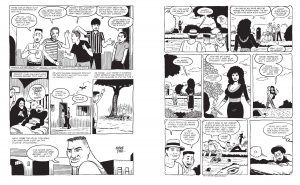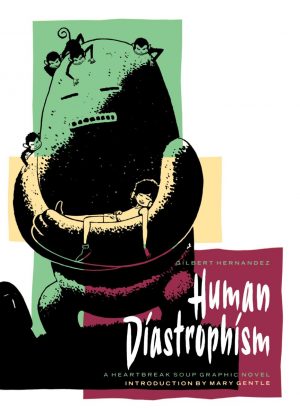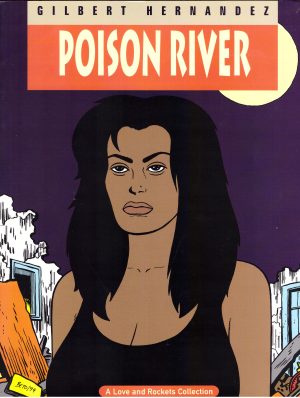Review by Frank Plowright
From the smart cover design onward, the 1987 Titan edition of Heartbreak Soup takes a more sensible approach to the presentation of Gilbert Hernandez’s early Palomar stories than the US equivalent Heartbreak Soup and Other Stories. Here the only other stories are set in Palomar, which may disappoint anyone who admires Hernandez’s versatility, but it makes for a stronger collection. The running order is also slightly different, Titan over their three Hernandez collections opting for reprinting the stories as he produced them, with the occasional absence. Anyone wanting to read the four pages of ‘Toco’ won’t find them here, while ‘A Little Story’, present in the American trade, is also missing. Instead we have an absolute gem over the three pages of ‘The Whispering Tree’.
When Hernandez began his Palomar stories with the title piece, he initiated something entirely new. No-one had previously considered comics the place for dramas about ordinary, if often eccentric, people involving such a large cast. Hernandez added atmosphere by setting the series in a small Latin American town, and including very effective moments of mystical realism such as the local teenage boys able to see ghosts and accept it as everyday. Because Hernandez quickly improved, ‘Heartbreak Soup’ is now an endearing early work, very readable with well drawn personalities, but lacking the storytelling complexity Hernandez evolved. It concerns the arrival of Luba in Palomar, the character around whom so many later stories will be set, and the conflict caused by her setting up a bath house in competition to Chelo.
The leap in ability is apparent with ‘The Laughing Sun’, produced a year later in 1984, and set when those teenage boys are adults, some having left town. Loyalty to a friend brings them back together, and Hernandez is impressively subtle in showing how the ties of youth are really all they have in common any more. An indication of his growing sophistication as a storyteller is that of the four who come together, the only one still living in Palomar is Heraclio, seen in the earlier story as an incomer. He’s very much Palomar’s voice of common sense, yet as a short story shows, also prone to hypochondria.
In hindsight it’s surprising how quickly the art evolves, Hernandez good with expressions and poses from the start, but learning how to simplify and cultivating the confidence to let the visuals tell more of the story.
Luba takes centre stage in ‘Act of Contrition’. Her strength and confidence have already been introduced as defining characteristics, and her essentially selfish nature will feature in numerous follow-ups. ‘Isidoro’s Beach’ exemplifies another Hernandez innovation. Palomar’s children are as important to the stories as the adults, not irrelevancies to be isolated in their own self-enclosed world. We’ll come to know Luba’s daughters very well.
Because Hernandez became so much better and explored his cast with ever greater depth, Heartbreak Soup is no longer the eye-opening collection it once was, but remains very readable when compared to the later work of creators influenced by it.
Some of this content was previously found in The Complete Love and Rockets Vol. 2, and most would subsequently be incorporated into Love & Rockets: Chelo’s Burden. In 2007 it all featured in the reformatted collections of Hernandez’s work as Heartbreak Soup. It’s also in the bulky hardcover Palomar collection along with the content of the following Duck Feet and Human Diastrophism.





